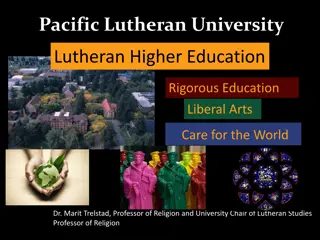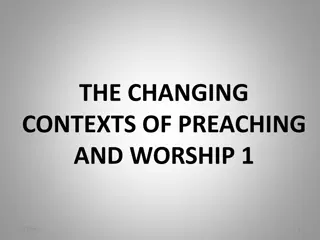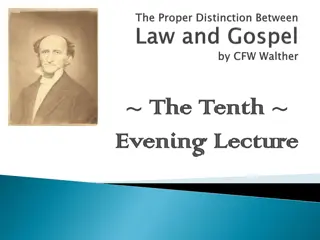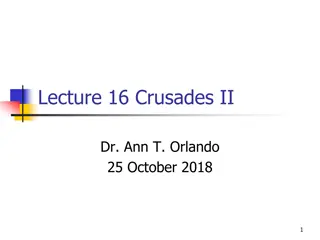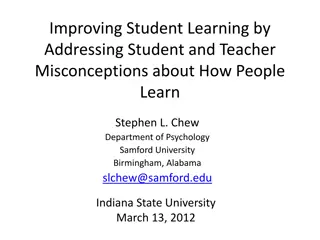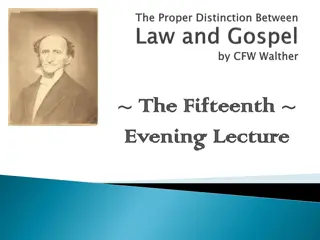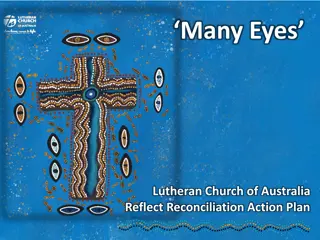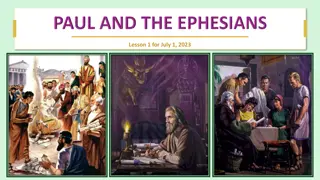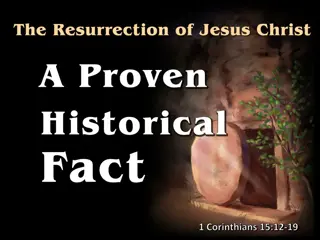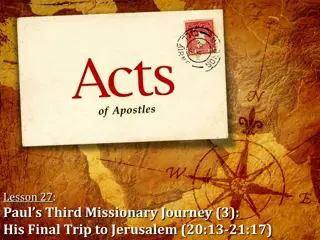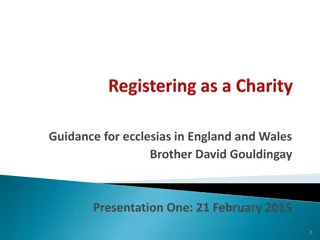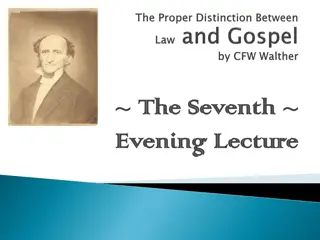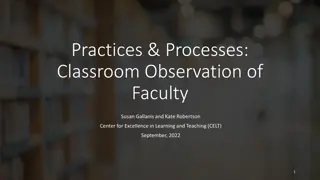Importance and Challenges of Preaching in Lutheran Teaching
The content discusses the significance of preaching in Lutheran teaching, emphasizing that there is no substitute for it. It explores the difficulty in delivering a real sermon and the tasks involved in awakening souls, leading them to faith, providing assurance, sanctification, and confirmation. It also touches on the need for contrition alongside faith for obtaining forgiveness of sins.
Download Presentation

Please find below an Image/Link to download the presentation.
The content on the website is provided AS IS for your information and personal use only. It may not be sold, licensed, or shared on other websites without obtaining consent from the author. Download presentation by click this link. If you encounter any issues during the download, it is possible that the publisher has removed the file from their server.
E N D
Presentation Transcript
~ The Twenty ~ The Twenty- -Third~ Evening Lecture Evening Lecture Third~
Walther reiterates the Lutheran teaching that there is only one way to salvation and the first step is a knowledge of what? Thesis 11 says that law and gospel are not rightly divided when contrition is depicted as proceeding NOT from fear of the wrath and punishment of God, but from what? 2
Among the various functions and official acts of a servant of the Church the most important of all, my friends, is preaching. Since there is no substitute for preaching, a minister who accomplishes little or nothing by preaching will accomplish little or nothing by anything else that he may do. 3
This function, however, is not only the most important, but also the most difficult. A real sermon is produced only after all the spiritual and intellectual energy of a truly believing preacher has been exerted to the utmost, after fervent prayer, after all earthly cares have been chased from the mind, and after the preacher has been freed from all vain desires. That is a difficult task. 4
First, to arouse secure souls from their sleep in sin; next, to lead those who have been aroused to faith; next, to give believers assurance of their state of grace and salvation; next, to lead those who have become assured of this to sanctification of their lives; and lastly, to confirm the sanctified and to keep them in their holy and blessed state unto the end. What a task! 5
In the eighth place, the Word of God is not rightly divided when the preacher represents contrition alongside of faith as a cause of the forgiveness of sins. 6
Contrition is necessary if a person wishes to obtain forgiveness of his sins. Why is repentance required as well as faith? Our Lord gives the reason in these words: They that be whole need not a physician, but they that are sick. 7
You must not forget that contrition is not a cause of the forgiveness of sins. 8
1. Contrition is an effect solely of the Law. 2. Contrition is not even a good work. For the contrition which precedes faith is nothing but anguish, pain, torment, a feeling of being crushed; all of which God has wrought in man. It is not an anguish which a person has produced in himself. 9
If one has the desire to come to Jesus, he has true contrition even if he does not feel it. The statement, then, that God is satisfied with a person s mere desire to have contrition is evidence of a mingling of Law and Gospel; for such a statement represents contrition as a merit. I.e., the desire to come to Jesus shows you re ready to do so; the mere desire to have contrition shows you re not. 10
Theyre not contrite for the rest of their sins. These people are not alarmed because they regard themselves as poor sinners, but it is one particular sin that frightens them. They may tell the pastor that they admit being at fault in this, that, or the other thing in which they slipped unavoidably, but they appeal to the fact that they are good at heart. If a pastor is satisfied with a partial contrition of this sort, he treats contrition as a merit. 11
what must be the quality of their contrition from texts like Ps. 6, 7 8: I am weary with groaning; all the night make I my bed to swim; I water my couch with my tears. Unless he can point to these criteria of what they regard as genuine contrition, [such pastors] tell him not to imagine that he has been truly contrite. 12
He didnt wait at all. Nathan noticed at once that David had been struck down and was crushed. Accordingly, he said to him: The Lord also hath put away thy sin. 2 Sam. 12, 13. 14
They warned people not to believe too soon, telling them that they must allow the Holy Spirit to work them over thoroughly. What will become of such a one if he dies before he is ready to believe? 15
we should for Gods sake confidently preach the Gospel to him. It will not be too soon. 16
If such a person were to die after I had told him that he cannot yet come to Jesus, God would demand the soul of that sinner from me. 17
They fall to distinguish the daily repentance of Christians from the repentance which precedes faith. 18
Contrition of this kind is not a mere effect of the Law, produced by the Law alone, but it is at the same time an operation of the Gospel. When contrition proceeds from love of God, it is indeed a truly sweet sorrow, acceptable to God. 19
This, then, is the thunderbolt of God. by which He hurls to the ground both manifest sinners and false saints and suffers no one to be in the right, but drives them all together to terror and despair. 20
the New Testament immediately adds the consolatory promise of grace through the Gospel. 21
They did not know the real sins. According to them wicked emotions, lust, and improper dispositions are not sins. 22
Because they teach that contrition is a good work. They asked whether he did not wish or desire to have contrition. When one would reply, Yes (for who, save the devil himself, would say no to such a question?) , they accepted this as contrition and forgave him his sins on account of this good work of his. 23


